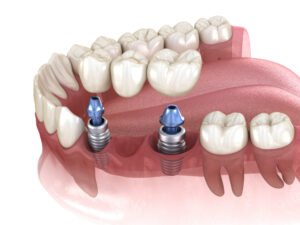Affordable & Stable Smile Restoration with Implant-Supported Bridges
Ever wondered about a dental solution that feels as secure as it looks natural? Look no further than Northbridge Dental, where our experienced Roswell and Alpharetta, GA implant dentists offer cutting-edge implant-supported bridges. Say goodbye to traditional bridges and hello to a more stable, long-lasting smile.
Call (678) 319-0210 for Alpharetta or (678) 352-9890 for Roswell, and discover a confident, natural-looking solution for your dental needs.
What Are Implant-Supported Bridges?
Implant-supported bridges are dental prosthetics designed to replace missing teeth by utilizing dental implants for support. Unlike traditional bridges that rely on adjacent teeth for anchoring, implant-supported bridges are secured to dental implants surgically placed into the jawbone. These implants serve as sturdy foundations for missing teeth, providing a stable and durable structure for the bridge. The result is a natural-looking dental restoration that effectively fills the gap created by missing teeth while offering increased stability and support.
Benefits of Implant-Supported Bridges
The benefits of dental implant-supported bridges are numerous, ranging from the aesthetic to the functional. Some of the many benefits of implant-supported bridges include the following:
- Enhanced Stability: Dental implants anchor the bridge securely to the jawbone, providing a stable and permanent solution. This stability contributes to improved functionality and comfort compared to traditional bridges.
- Natural Appearance: Implant-supported bridges closely mimic the look and feel of natural teeth. The secure integration with the jawbone ensures a seamless and aesthetically pleasing smile.
- Affordable: Replacing missing teeth with an implant-supported bridge, often involves using fewer implants, which means spending less money.
- Preservation of Adjacent Teeth: Unlike traditional bridges, implant-supported bridges do not rely on neighboring teeth for support. This means that the adjacent natural teeth remain unaffected, promoting long-term oral health.
- Durable and Long-lasting: Dental implants are known for their durability, and when properly cared for, implant bridges can last for many years. This longevity makes them a cost-effective and reliable dental restoration option.
- Improved Jawbone Health: The integration of dental implants into the jawbone helps maintain bone density and prevents deterioration, contributing to overall oral health and facial structure.
- Enhanced Chewing Ability: The stability provided by implant-supported bridges allows for more effective biting and chewing, restoring the full functionality of the dental arch.
- Boosted Confidence: With a natural-looking and securely anchored dental restoration, individuals often experience increased confidence in their appearance and oral function.
- Convenience in Maintenance: Implant-supported bridges are easy to clean and maintain. Regular oral hygiene practices, such as brushing and flossing, along with routine dental check-ups, are typically sufficient to ensure their longevity.
Who Qualifies for Implant-Supported Bridges?
Generally, suitable candidates for implant-supported bridges share the following characteristics:
- Good Oral Health: Candidates should have a generally healthy oral environment, free from active gum disease or untreated dental issues. Any existing dental concerns should be addressed before considering implants.
- Adequate Bone Density: Sufficient jawbone density is crucial for the successful integration of dental implants. If a candidate lacks the necessary bone support, additional procedures like bone grafting may be recommended to enhance the implant’s stability.
- Overall Health: Candidates should be in good overall health, as certain medical conditions or medications may impact the healing process. It’s important to provide a comprehensive medical history to the dental professional.
- Non-smokers or Willingness to Quit: Smoking can hinder the healing process and increase the risk of implant failure. Candidates who smoke may be advised to quit or significantly reduce their smoking habits.
- Commitment to Oral Hygiene: Implant-supported bridges require consistent oral care. Candidates should be committed to maintaining good oral hygiene practices, including regular brushing, flossing, and dental check-ups.
- Realistic Expectations: Candidates should have realistic expectations about the outcome of the procedure. While implant-supported bridges offer excellent results, understanding the process and potential limitations is essential.
The Implant-Supported Bridge Process
Consultation
During the initial consultation, one of our implant dentists will evaluate your oral health. This involves a thorough examination, discussions about medical history, and assessments of bone density through imaging, such as X-rays or CT scans. You’ll also discuss expectations, potential risks, and alternatives. This is the stage where the candidacy for implant-supported dental bridges is determined.
Design
After confirming the eligibility for implant-supported bridges, the dental team proceeds to the design phase. Detailed impressions and digital images of your mouth are taken to create a customized treatment plan. The design includes the number of implants needed, their optimal placement, and the design of the bridge. This stage allows for careful planning to ensure a natural look and optimal functionality.
Preparation
Once the treatment plan is finalized, the next step involves preparing the mouth for implant placement. This may include performing tooth extraction for damaged teeth, addressing existing oral health issues, and, in some cases, bone or gum augmentation procedures.
Implant Placement
Surgical placement of dental implants into the jawbone is done under local anesthesia. Once we’re sure you’re numb, one of our implant dentists will make small incisions into your gums where the implants will go. Then, the implants are strategically positioned according to the predetermined plan. Over the next few months, a process known as osseointegration occurs, during which the implants fuse with the surrounding bone, providing a stable foundation for the bridge.
Bridge Placement
Once osseointegration is complete, the final bridge can be attached. This prosthetic bridge is securely anchored to the previously placed dental implants. The fit is carefully checked, and any necessary adjustments are made to ensure a comfortable and functional result. From there, you can enjoy your new smile.
Implant-Supported Bridge Aftercare
Proper aftercare is crucial for implant success. Here are some of the most common tips on how to care for your new implant retained bridge:
- Immediate Post-Procedure Care: Adhere to any specific instructions provided by your Alpharetta or Roswell dental professional regarding post-operative care, including prescribed medications and pain management.
- Oral Hygiene: Maintain good oral hygiene by gently brushing the teeth, gums, and the implanted bridge. Use a soft-bristle toothbrush and follow any recommendations for special oral care products.
- Soft Diet Initially: Stick to a soft diet in the days following the procedure to avoid putting excessive pressure on the newly placed implants. Gradually reintroduce harder foods as recommended by the dental professional.
- No Smoking: If you smoke, it’s advisable to quit or reduce smoking significantly. Smoking can hinder the healing process and increase the risk of complications.
- Limit Alcohol and Caffeine: Limit or completely avoid alcohol and caffeine, as these substances can potentially interfere with the healing process.
- Scheduled Check-ups: Attend all scheduled follow-up appointments. These appointments allow your implant dentist to monitor the healing progress, address any concerns, and make necessary adjustments.
- Gentle Flossing: Use a gentle, unwaxed floss or an interdental brush to clean between the implanted bridge and natural teeth. Proper flossing helps prevent plaque buildup and maintains healthy gums.
- Antimicrobial Rinses: If recommended by the dental professional, use antimicrobial or prescription mouth rinses to minimize the risk of infection.
- Night Guards: If you tend to grind your teeth at night, consider using a night guard to protect the implants and the surrounding teeth from excessive pressure.
- Immediate Concerns: Contact Northbridge Dental promptly if you experience severe pain, swelling, bleeding, or any signs of infection. Early intervention can prevent complications.
- Regular Dental Check-ups: Continue visiting us for regular dental check-ups and professional cleanings to ensure the overall health of your oral cavity and the longevity of the implant-supported bridges.

